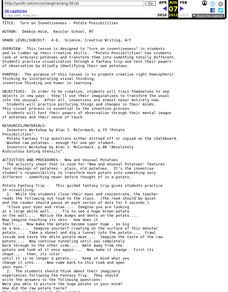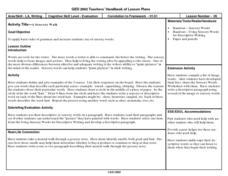Curated OER
Turn on Inventiveness
Students practice visualization through a fantasy trip and test their powers of observation by blindly identifying their own potatoes.
Curated OER
Wizard Vision
Students participate in a visualization exercise. Then listen to an excerpt from 'Harry Potter and the Sorcerer's Stone' and discuss what they 'see.' Independently, they read the second chapter and draw a picture of what they visualized...
Curated OER
Investigating Transformations Of Parent Functions
Students identify the basic transformations of parent functions. They use their graphing calculator to create a transformation booklet by folding a sheet of computer paper in half and stapling along the folded edge.
Curated OER
Where are your borders?
Students explore the meaning of borders, both real and symbolic. After viewing film footage and visiting poetry websites, they develop their own point of view. To express their perspective, they are to write a journalism poem, or...
Curated OER
Life Inside Castle Walls
Students compare their life-style with the Middle Ages, create their own castles and end with a feast. They explore life in the Middle Ages, use their information and creativity to design a castle & a personal coat of arms; students...
Curated OER
Geometry Gymnastics
Students identify shapes and manipulate 2 and 3 dimensional objects. They view objects from different perspectives and review relative positions (near, far, between). They sing a shape song.
Curated OER
A Sensory Walk
Students define and give examples of five senses, compiling a list of sensory words to be used in a written descriptive paragraph.
Curated OER
Why Are Celebrations Important?
Students complete a variety of activities in their study of Chinese culture. They explore the Chinese New Year, zodiac, calligraphy, dragon kites, lanterns, games, and songs among others.
Curated OER
Dysfunctional Eating
Sixth graders study the concept of dysfuctional eating including anorexia nervosa, bulimia nervosa, binge eating disorder, fad dieting, and having an unbalanced diet. They watch and discuss videos about eating disorders and then they...
Curated OER
Real Attractive
Sixth graders create a collage of attractive people. They write about what makes these people attractive. They discuss what makes someone attractive. They research eating disorders and how the media impacts what people deem as attractive.
Curated OER
Breaking News English: Soldier Admits Guilt over Iraq Photos
In this English activity, students read "Soldier Admits Guilt over Iraq Photos," and then respond to 47 fill in the blank, 7 short answer, 20 matching, and 6 true or false questions about the selection.
Curated OER
Dysfunctional Eating
Sixth graders write a 1.5 page paper explaining how to make their favorite nutritional snack. They need to assume that the audience has never seen or heard of the snack before.
PBS
Pbs Learning Media: Welcome Home Balto Lesson Plan: Molly of Denali
This lesson, based on the animated story "Welcome Home Balto" from the PBS KIDS series MOLLY OF DENALI, helps children use visual imagery to enhance comprehension while listening to and reading informational texts. After Molly hears the...
Alabama Learning Exchange
Alex: Let Them Eat Cake! Topography Lesson
Contour lines on topographic maps require visual processing to read and interpret. This hands-on activity helps give a tasty mental image.
TED Talks
Ted: Ted Ed: Ideasthesia: How Do Ideas Feel?
The traditional model of our mental function is that first our senses provide data to our brain, which then translates those senses into the appropriate mental phenomena: light into visual images, air vibrations into auditory...














